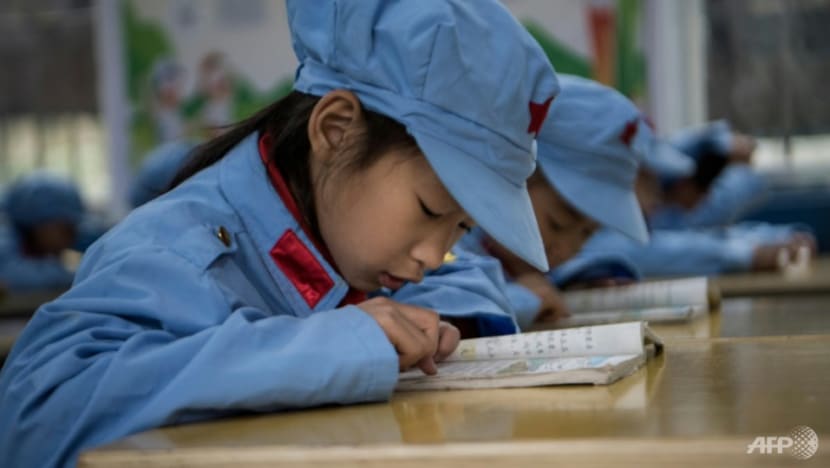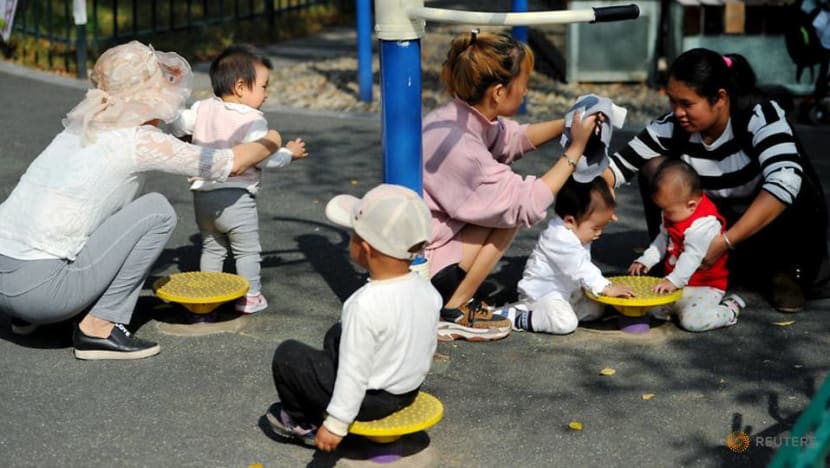commentary Commentary
Commentary: Why China is making a strong push for financial literacy in schools
Real estate bubbles have led policymakers to think more deeply about how to prepare a population for a Chinese economy more open to foreign investments and trade, says Tom McGregor.

A student from the 'Red Army primary school' reading (Photo: AFP/Fred DUFOUR)
BEIJING: Soon, young Chinese children, including those attending first grade, will be learning the ABCs of price-to-earnings ratios, and fun facts about the Capital Asset Pricing Model (CAPM).
The Chinese Regulatory Securities Commission (CSRC) just last week announced plans for primary and secondary schools across the nation to teach students financial literacy courses.
These efforts will begin with the introduction of appropriate curriculum in standard textbooks and the use of other innovative education tools to educate a public that has seen many retirees and less savvy investors lose their life savings due to risky schemes and financial fraud.
The problem has gained new impetus as China begins to open up its stock exchange to seek fresh funds for Chinese companies and has seen through a few real estate market bubbles.
The concept was launched a few years earlier as a pilot project in schools in Shanghai, Guangzhou and Shenzhen was rolled out. Classes had proven so popular that more schools across the country were keen to adopt similar modules.
In Chengdu, one primary school offered the fascinating option of taking an investment course that include visits to financial and securities institutions and talks by experts.
After some discussions, China’s Ministry of Education and the CSRC agreed to introduce a more comprehensive curriculum and scale-up the financial literacy pilot programme.
REAL ESTATE NOT A CURE-ALL
For far too long, Chinese families had been urged to invest their cherished savings solely in real estate. The argument was simple: Property prices kept rising, as China’s economy surged ahead, so there was little downside risk.

But new concerns have emerged, as news of vacant apartments straining real estate prices made headlines. While authorities wanted to keep housing prices buoyant to boost the economy, as indebtedness grew and home ownership became commonplace, they could not ignore the fact that market exuberance could fuel boom-and-bust cycles.
Still, apart from slowing lending to manage the property bubble, Chinese officials also realised they had a much bigger problem at hand: Many Chinese who had watched the economy mushroom for many years were tempted to grab a slice of the incredible profits growth offered, without a sense of the risks involved or how quickly the costs of borrowing could change.
READ: With meteoric growth, China has a place among the world's advanced economies, a commentary
This latest move now place the onus of understanding these risks on Chinese schools. The hope is the programme inculcates an awareness, self-discipline and understanding of what it will take to make sound financial decisions in a new Chinese generation.
This includes ingraining an ethos of risk-taking, so that the population’s future investment decisions are undertaken with a keen appreciation of the risks, and Chinese investors strive to educate themselves with appropriate research, market knowledge and third-party expertise in developing a sound investment strategy.
With the growing financialisation of the Chinese economy, effective financial literacy courses can prepare youths to navigate an increasingly complex economy and equip them with practical money management skills.
FUN-FILLED APPS FOR CHILDREN
We often underestimate what children are capable of, whereas it is an imperative to immerse them early in an environment that teaches them the realities of financing, the pitfalls of portfolio management and the virtues of saving early from a young age.
We rob our children when we deem topics that we might not have been exposed to from a young age to be too complicated for them, whereas the world they will live in will demand they be comfortable with simple financial tasks.

READ: Will our children still have a habit of saving, financial literacy in a cashless society? A commentary
There are apps that allow kids to act out roles as virtual stock market investors, charity organisers, celebrity financial managers grocery shoppers. There are also apps that help them track their pocket market expenses and familiarise themselves with lifetime expenses.
Chinese tech firms have jumped into the game to develop new apps, videogames and digital devices to teach them basic financial skills with some exploring how to integrate these into coursework.
Schools and universities have also been encouraged to come up with their own courses, partner financial institutions and adopt new learning tools including the gamification of financial literacy and entrepreneurship workshops to create an immersive experience for the young.
For the curriculum to succeed nationwide, teachers must be more familiar with the materials and have a good investment knowledge. So it is fortunate that China’s Ministry of Education, CSRC and the OECD (Organization for Economic Cooperation and Development) have plans to work together to ensure that teachers can obtain support for an enhanced financial literacy curriculum.
These efforts are expected to raise standards of financial literacy across the education system in China. Chinese universities are expected to teach more courses about the stock markets, while some schools will make such classes mandatory in order for college or university students to graduate.
THE FUTURE
Chinese government planners have been known to hold a long-term outlook when forging ahead on projects. They believe that the nation’s markets are headed for turbulence as China accelerates reforms, and the Chinese public must be prepared for that.
Having Chinese schools ingrain financial literacy as a core area of education will help Chinese families adapt to changing circumstances and rapidly shifting economic conditions.
Tom McGregor is a commentator on Asia-Pacific affairs based in Beijing.














